Lost + Found

A survival course at Maine Primitive Skills School reconnects us to the natural world in Maine’s wild woods.
by Katy Kelleher // Photography by Michael D. Wilson
Michael Douglas is the founder of Maine Primitive Skills School (MPSS). A former Marine, a Registered Maine Guide, and an avid naturalist, Douglas is working to increase students’ “deep knowledge” of the outdoors.
There’s a word for the loss you feel when the natural world experiences a wound: solastalgia. Coined by philosopher Glenn Albrecht in 2005 from the Latin word for comfort and the Greek root word for pain, it can refer to the depression one feels about climate change, but it can also refer to smaller sadnesses than that. It can describe how you feel knowing that your favorite beach is about to be over- developed. It can describe the loss of a garden or the destruction of a tree house. It’s like homesickness, in a way. It’s grief, but not for a person. It’s grief for a place.
Michael Douglas, founder of the Maine Primitive Skills School, feels a bone-deep sorrow when he thinks about the forests of his youth. He grew up playing in the southern New Jersey Pine Barrens. “I didn’t want to get rescued from those woods,” he says. “I wanted to get rescued from civilization.” He went into the yellow forests by the shore to wander and to wonder. “It was a magical place,” he says. “And then I watched it all go.”
The Pine Barrens of his childhood were destroyed by development: condos and businesses, money and forward motion. This was Douglas’s first great loss, and it’s one he’s been working to understand for his entire adult life. This is his specific solastalgia, but he says there’s a more general one, too. He’s spent his entire life questing after nature knowledge, and the more he learns, the more he realizes what has been lost. After spending time trading skills with the Sámi (an indigenous people who live in the European arctic circle) in Northern Norway, Douglas came to more fully formulate his idea about the collective mourn- ing process that most citizens of industrialized nations pass through, even if they may not know it. “There’s a tragic loss that happens when we’re separated from the land,” he says. “The post-trauma effect causes us pain and angst. Many people experience [these emotions] in their twenties, and they struggle to figure out what to do.”
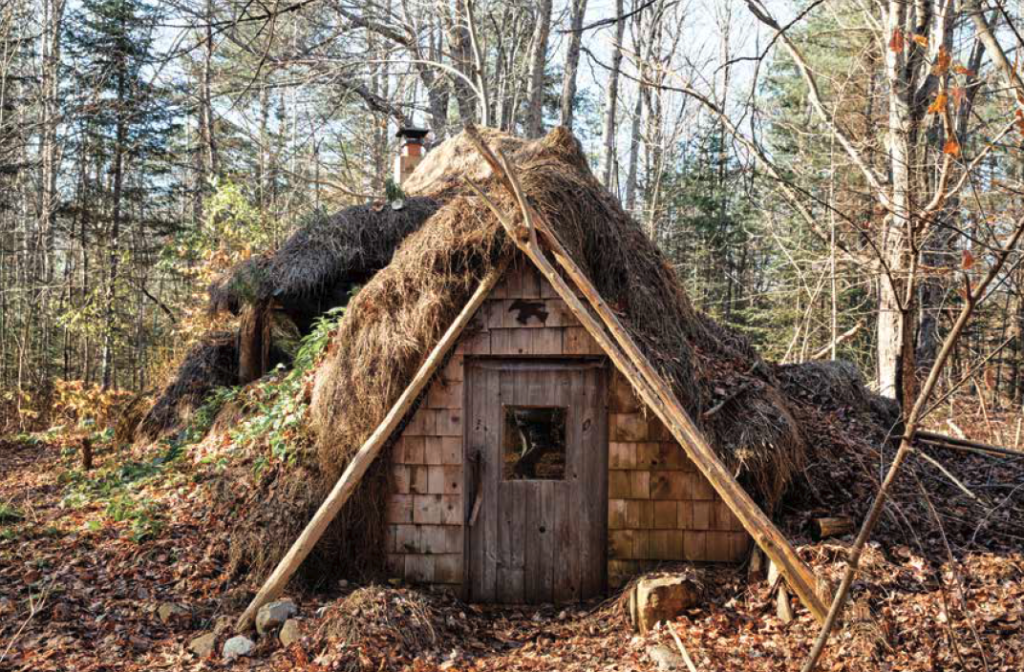
The goal of Maine Primitive Skills School (MPSS) in Augusta is to help restore this relationship between human and land by providing “deep nature knowl- edge.” Nature-starved adults can sign up for a variety of courses, some of which run for a few hours; others last a weekend, and still others span a full six months. You can learn foraging or bushcraft, tracking or fire-starting. You can learn to build an earth shelter or how to survive for months off the land, how to eat acorns and cattails, how to sleep safely outside. The depth of your knowl- edge depends on how much time you’re willing to spend on the wooded property, how many nights you want to spend outdoors, and how much work you’re willing to put into the program. (It also depends on whether you can afford tuition fees and the time off; it costs $350 for a weekend program and around $3,000 for a resi- dential semester program, though MPSS also offers a work-trade program for students who need it.)
Like Douglas, I find it restorative to spend time under the open sky. When I’m out in the woods, I feel like a better version of myself. I feel calmer, quieter, and even (paradoxically) a bit cleaner. I go into the forest to gain strength, both physical and mental. I go camping for fun, but also because there’s something about the work of it that appeals. I like to light fires and cook my own food. I like to do small chores. It feels more fulfill- ing than sending emails or attending Zoom meetings. It feels like work.
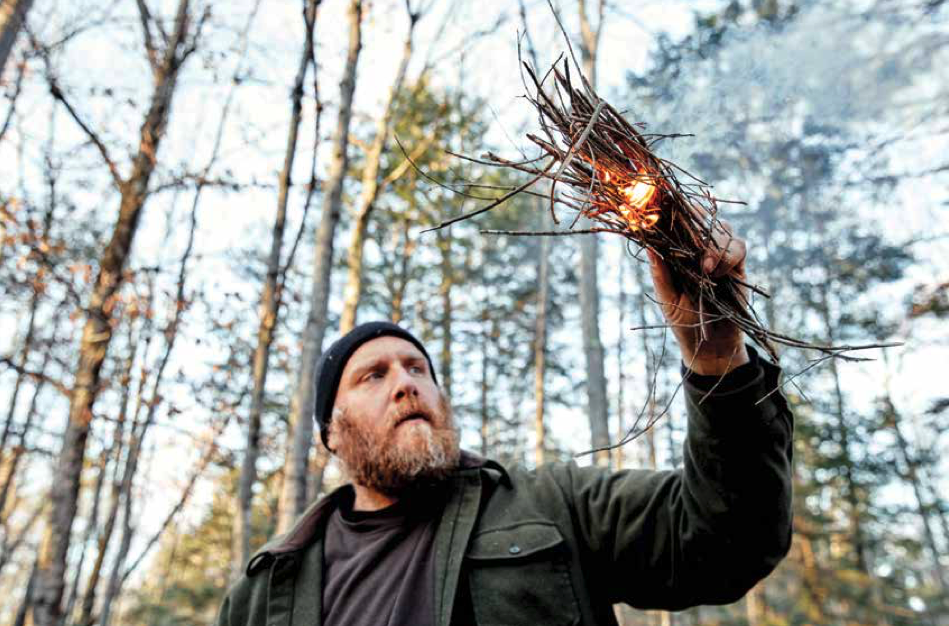
But MPSS takes it much further than I ever have. Students who attend the weekend-long Founda- tions in Survival Course don’t have bedrolls or tents (much less the teardrop trailer, futon mattress, solar- powered lantern, and metal wine glasses I pack for trips to Moosehead). Instead, they sleep on beds made of fallen leaves in tents made from tarps. Under the guidance of instructor and Registered Maine Guide Lou Falank, they learn to how to survive as a team using a few simple tools. They are asked to wear warm clothes and bring a knife. They are given plastic trash bags, matches, and tarps. And then they spend the night in the cold.
It is November and cold enough that our breath is misting in the air, cold enough that I keep myself moving constantly during my time in the outdoor classroom. When I am sitting on the rough-hewn benches learning to tie bowline knots, I jiggle one leg up and down. As the six students disperse into the forest to gather kindling, I shadow Falank’s tall form as he explains the school’s hands-on pedagogy. “When we were walking up here, I pointed out the balsam trees and told them that, ‘Higher is drier,’” he says. “That was me planting a seed. I also told them, ‘If you can’t snap it, scrap it.’” Students who apply this knowledge will know to look higher up for kindling, rather than gathering it from the wet forest floor. They’ll know to grab dead branches, which give an audible snap when they’re broken, rather than green (live) ones. As Falank chats with me, a student calls out a question. “Do acorns catch easily?” asks aman in a baseball cap. Falank doesn’t give an answer. “You’ll find out,” he says.

In a few minutes, several of the students have six-inch-tall fires going. Some have given up, and one student has a tiny fire that is quickly sputtering out. Falank returns to the group and helps his struggling students to complete the assigned task. Each station has two sticks suspending a string 18 inches from the ground. In order to master the lesson, they must first light a fire that reaches high enough to burn the string, then they must boil a single can of water over the fire. “Why do we do fire before water?” Falank asks the class. For a brief pause, everyone is quiet. Then, Gina Tansey speaks up: “You have to boil water you gather if you’re going to drink it.”
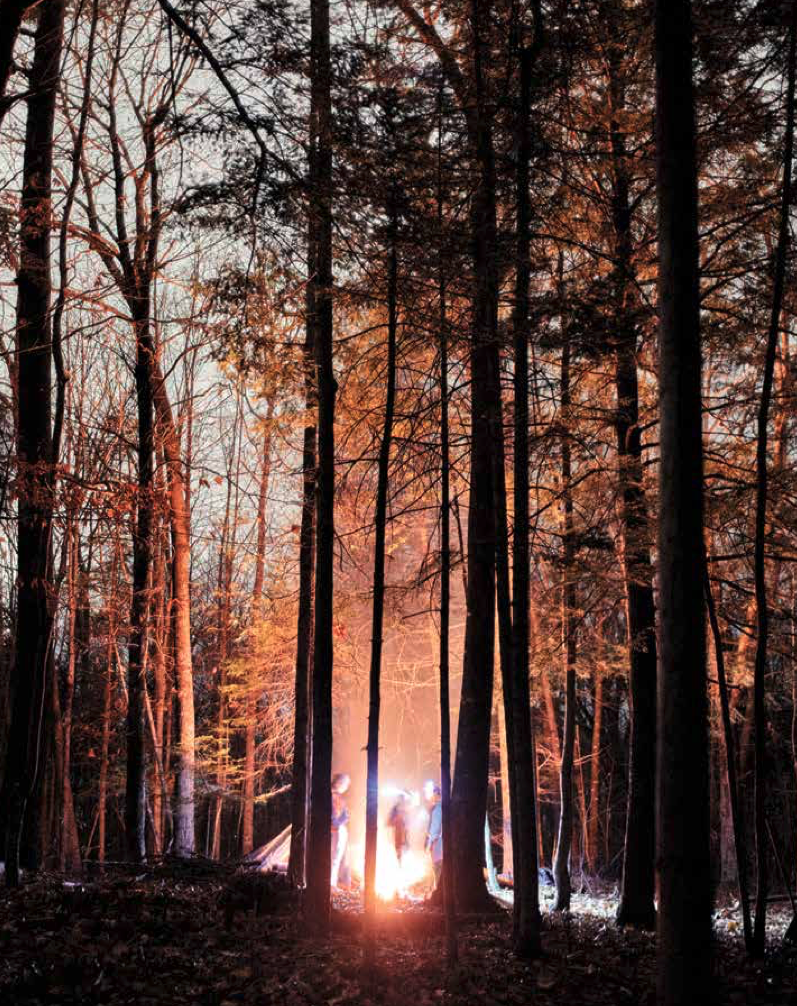
“That’s right,” says Falank. “That’s why I teach in order: Shelter, water, fire, food.” This isn’t the first time today we’ve heard this litany. Before we started with the fires, we walked by simple demo lean-tos and learned how to rig up the tarps. It also won’t be the last time we hear about the “core four” needs, as they’re referred to in survivalist circles.
Tansey is a self-described “wannabe prepper” who throws herself into each task with the energy of a former straight-A student. It’s clear that she’s thrilled to be in these brown November woods, counting needles on pine trees (to iden- tify the species) and crumpling fistfuls of dried goldenrod (to store in pockets and use as a fire-starter). “Having read several novels of the post-apocalyptic genre, I have thought a lot about survival techniques, but I had never before pursued learning them,” she explains. The Fundamentals in Survival Course is the first time Tansey has moved out of the imagi- native realms of literature and into the very real world of the late fall forest. Instead of dipping her toe into the water with an evening course or a guided walk, Tansey decided to go full- bore. After the course is over, she says she finds herself think- ing often about the night she spent on the ground.

for a weekend crash course in survival skills.
In fact, all the students I check back in with in the months following the course mention that night. With a baby at home, I am unable to stay over, so I miss the lessons Falank imparts after dark. Or, rather, the lessons that the dark, cold night imparts to the students. Although the team gathered a woodpile “roughly the size and shape of a small car,” says Tansey, “this wasn’t nearly enough.” The students had been instructed to sleep in shifts so that there would always be one person tending the fire. Each late-night watcher found them- self forced back into the dark trees to find more wood, which they would feed to the central fire while the others tossed and turned on their beds of leaves.
“I was on shift at 3 a.m., and it was a really dark and chilly morning,” remembers Aldo Pascarella. Each time he sought more wood, he had to go farther and farther from the fire to find suitably dry fuel. He had signed up for the course with his 11-year-old son, Harrison, as a bonding experience. When 4 a.m. rolled around, he was supposed to wake up Harrison, but he was “sleeping so peacefully, I decided to stay up and take his watch.”
During his second watch, Pascarella nodded off. “I woke with a start,” he remembers. “Some sparks blew onto one of the other participants in sleeping bags and had started to burn away the cloth.” He got up, put out the sparks, and went back to his watch. He realized it probably wasn’t the best idea to take a double shift—not if he was going to slip into sleep. The fire might have gone out. And if this had been a real life-or- death scenario, his comrade might have become injured, and in the woods, any injury, however small, can lead to infec- tion and death. As it was, Pascarella’s oversight led to a singed sleeping bag, nothing more. Still, he says, “She wasn’t sure whether to be angry with me for letting her sleeping bag get ruined, or grateful that she wasn’t roasted inside of it.”
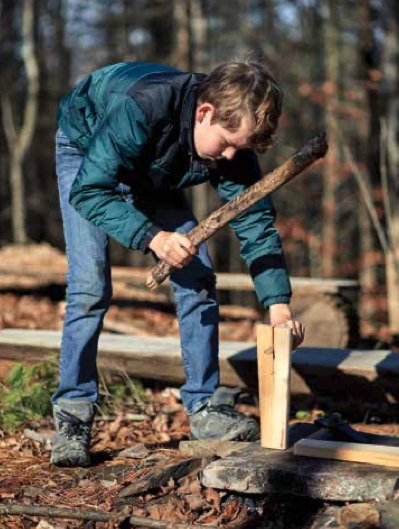

As with so many things, what you get out of MPSS depends on what you put in. If you come for an interesting experi- ence, you will have one. Harrison walked away with a story about how Falank pulled a tick from his leg (“with his bare hands!”). Tansey still thinks about the “higher is drier” maxim and finds herself applying it to daily life (especially when looking for a place to sit outdoors). I went home and told my husband and baby about finding a patch of deer beds in the tall grass by the edge of the wood, which Doug- las pointed out in a reverent tone. I told friends about the earth shelters, which looked like little hobbit houses. And I posted pictures online of Douglas’s unique outhouse, which was perched among the trees and featured a Plexiglas bird-watching station, complete with a handy field guide.
But if you come to MPSS looking for something deeper and more complex (like a temporary cure for your solastalgia), there’s a chance you might find that there, too.
It’s a little like going to a museum. Sometimes, I like to spend an afternoon strolling through the Portland Museum of Art looking at landscapes in gilded frames and pausing here and there to admire a blown glass vase or a marble bust. My eyes move around the room, scanning for anything new, anything I haven’t seen before. It feels good. There’s nothing wrong with looking lightly. But sometimes, I go and stand in frontof the sculpture of the prone pearl diver by Benjamin Paul Akers and let my gaze soften on the marble curves I know so well. I marvel. I drink it in. I wonder at the sheer range of human ability, at our capacity to make beautiful things, our ability to love deeply and commit fully. I feel connected to all the people in the world who admire, who love, who yearn.
The woods are no different. You can start a fire, cook a can of beans, and call it a day. You can hike through the woods and name a few trees, make a lean-to. You can gather pieces of knowledge like trading cards and pull them out at parties. These are all good ways to interact with the world. But Doug- las hopes that MPSS will tap into something deeper in students. Maybe it will allow them to feel their connections to the land more fully. Maybe it will allow them to better understand themselves, to better understand how humanity lives upon the Earth, lives with the Earth. It might provide flashes of bone-deep gratitude, a sense that they’re doing the right thing in just the right moment.
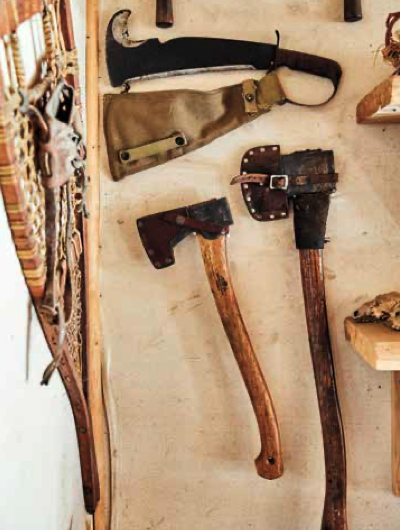
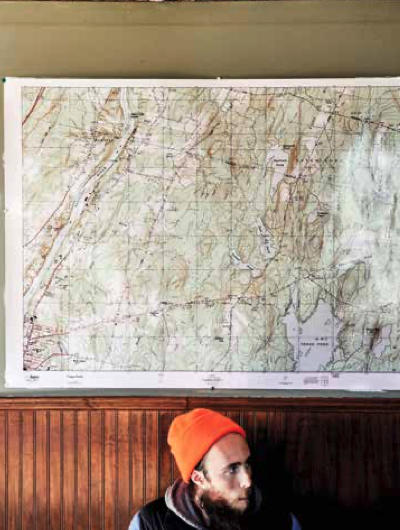
It has happened before. Some students come for a class and leave utterly changed, like Terra Soucie. “If you had met me before I did an apprenticeship here, I don’t know if I would have been able to talk to you,” she says as we sit side-by-side in the earth dwelling behind Douglas’s house. We’re alone in the quiet near-dark, perched on beds next to an unlit fire pit.
A little sunlight filters in through a window, and we both look at that as Soucie talks. “I wouldn’t have had the confi- dence,” she says. Soucie is a lifelong Mainer, and she came to MPSS to work and learn after spending a few years away from Maine, getting to know family in Oklahoma and Texas. “But I’m a nature nerd,” she says. “Maine is paradise for us. I came back because I missed the pinecones and chickadees.”
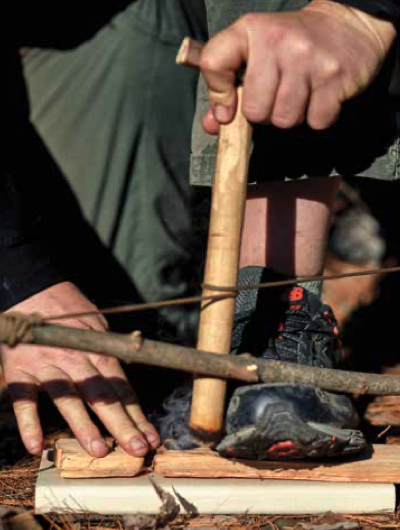
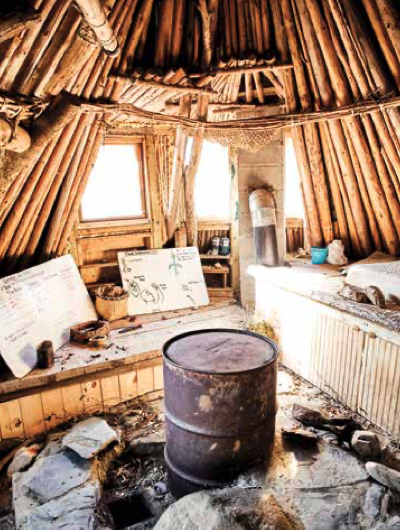
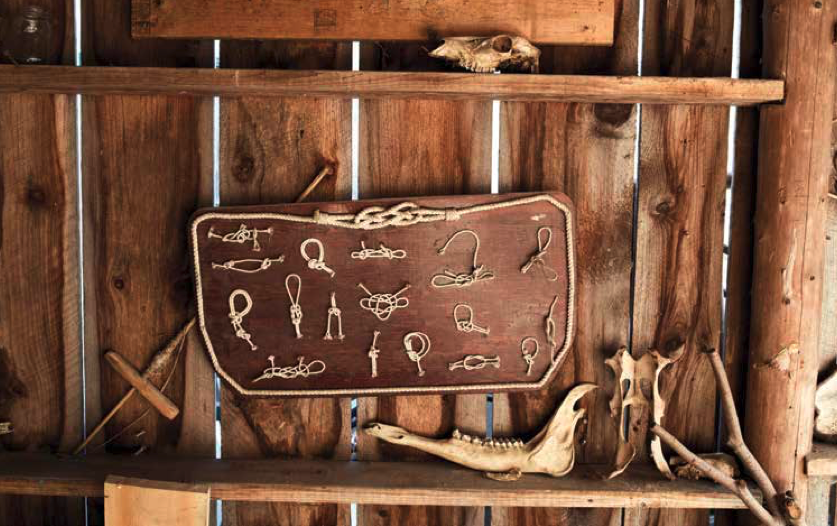
A few years ago, Soucie spent an entire spring and summer living on the grounds of MPSS. She had always loved hiking and camping, but she wanted to deepen her knowledge. She also wasn’t feeling quite at ease in the world. It was during that summer that she got her diagnosis. “I have ADHD, anxi- ety, and autism,” she explains. “I’m glad I was here when I got it. It helped me to accept myself and my diagnosis.”
The skills she learned with Douglas have helped her see herself more clearly. It’s not just that she’s more capable; she was always capable. It’s that she can see the benefits of her unique mind. “ADHD makes me a good hunter and gatherer,” she says. “My Asperger’s is expressed in ways that make me slower than some people. But here, I realized that this is nature’s speed.”

Douglas talks faster than Soucie does, but he also works at nature’s speed. We all do. That’s his point—when you tap into so-called primitive skills, you tap into your body and mind. You become aware of what the human body can accomplish when placed within a wild landscape. You become aware of what it needs, what it wants, how it func- tions. What it loves, even.
Douglas will always love the Pine Barrens of his New Jersey youth, but he’s found a suitable home in Maine, complete with trees, grasses, rich soil, and a community where he can preach the gospel of deep nature. “Deep nature literacy is our birthright,” says Douglas. “We lose it as we become institutionalized. But all of this”—he gestures to the world around us, big, cold, and strange—“is part of our wholeness as human beings.”

